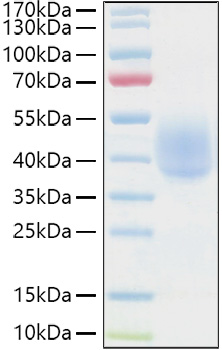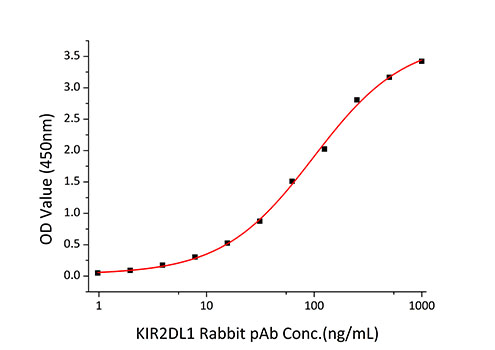Description
Recombinant Human NKAT-1/KIR2DL1/CD158a Protein
The Recombinant Human NKAT-1/KIR2DL1/CD158a Protein is a biologically active recombinant protein that plays a significant role in various cellular processes and signaling pathways in human biology. This protein is widely employed in immunological research, cell biology studies, protein-protein interaction analyses, and therapeutic development, providing researchers with a reliable tool for investigating NKAT-1/KIR2DL1/CD158a function and its implications in health and disease.
This product (SKU: RPCB0951) is produced using HEK293 cells and features a C-His&Avi tag for convenient detection and purification. The protein exhibits a calculated molecular weight of 26.87 kDa with an observed molecular weight of 38-55 kDa under denaturing conditions, achieving ≥ 95 % as determined by SDS-PAGE.. Functional bioactivity has been validated through rigorous quality control assays, confirming its suitability for demanding research applications.
Key Features
| High Purity by Affinity Chromatography | |
| Mammalian & Bacterial Expression Systems | |
| High lot-to-lot consistency via strict QC |
| Product Name: | Recombinant Human NKAT-1/KIR2DL1/CD158a Protein |
| SKU: | RPCB0951 |
| Size: | 10 μg , 20 μg , 50 μg , 100 μg |
| Reactivity: | Human |
| Synonyms: | KIR2DL1, CD158A, KIR-K64, KIR221, NKAT, NKAT-1, NKAT1, p58.1 |
| Tag: | C-His&Avi |
| Expression Host: | HEK293 cells |
| Calculated MW: | 26.87 kDa |
| Observed MW: | 38-55 kDa |
| Gene ID: | 3802 |
| Protein Description: | High quality, high purity and low endotoxin recombinant Recombinant Human NKAT-1/KIR2DL1/CD158a Protein (RPCB0951), tested reactivity in HEK293 cells and has been validated in SDS-PAGE.100% guaranteed. |
| Endotoxin: | Please contact us for more information. |
| Purity: | ≥ 95 % as determined by SDS-PAGE. |
| Formulation: | Lyophilized from a 0.22 μm filtered solution of PBS, pH 7.4. |
| Bio-Activity: | Measured by its binding ability in a functional ELISA.Immobilized Human KIR2DL1 at 1μg/mL (100 μL/well) can bind KIR2DL1 Rabbit pAb with a linear range of 1-99 ng/mL. |
| Reconstitution: | Centrifuge the vial before opening. Reconstitute to a concentration of 0.1-0.5 mg/mL in sterile distilled water. Avoid vortex or vigorously pipetting the protein. For long term storage, it is recommended to add a carrier protein or stablizer (e.g. 0.1% BSA, 5% HSA, 10% FBS or 5% Trehalose), and aliquot the reconstituted protein solution to minimize free-thaw cycles. |
| Storage: | Store at -20℃.Store the lyophilized protein at -20℃ to -80 ℃ up to 1 year from the date of receipt. After reconstitution, the protein solution is stable at -20℃ for 3 months, at 2-8℃ for up to 1 week. |
Killer cell immunoglobulin-like receptor 2DL1 or KIR2DL1 is an inhibitory Natural Killer cell immunoglobulin-like receptor with two extracellular immunoglobulin domains. KIR2DL1 is a member of the Killer cell immunoglobulin-like receptor family whose members are classified by the number of the extracellular immunoglobulin domains and the length of the cytoplasm domain. KIR2DL1 is a transmembrane glycoprotein expressed by natural killer cells and subsets of T cells. KIR2DL1 down-regulates the cytotoxicity of NK cells upon recognition of specific class I major histocompatibility complex (MHC) molecules on target cells. It has been reported that the KIR2DL1 is bound to its class I MHC ligand, HLA-Cw4. The KIR2DL1-HLA-Cw4 interface exhibits charge and shape complementarity. Specificity is mediated by a pocket in KIR2DL1 that hosts the Lys80 residue of HLA-Cw4. Many residues conserved in HLA-C and KIR2DL receptors make different interactions in KIR2DL1-HLA-Cw4 and a previously reported KIR2DL2-HLA-Cw3 complex. A dimeric aggregate of KIR-HLA-C complexes was observed in one KIR2DL1-HLA-Cw4 crystal.








